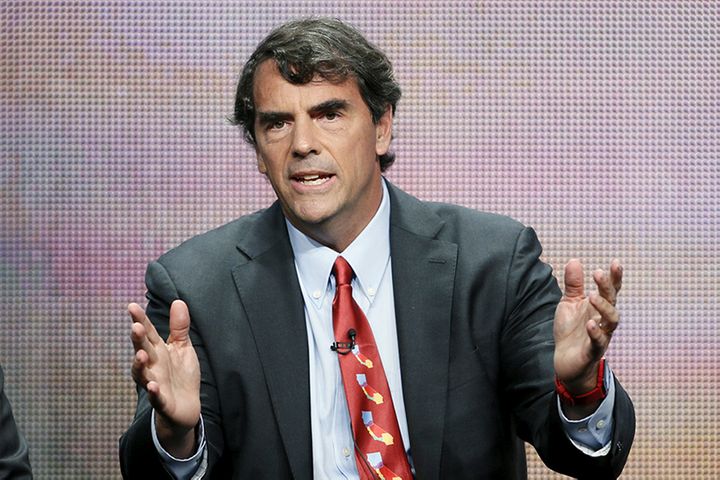 Up for the Impossible? Venture Capitalist Tim Draper Wants You!
Up for the Impossible? Venture Capitalist Tim Draper Wants You!(Yicai Global) Oct. 17 -- American venture capitalist Tim Draper made his fortune by making early investments in tech startups. When looking for new opportunities, he seeks entrepreneurs who are willing to try what 90 percent of people would deem impossible.
Money for Draper is a vehicle for change, allowing him to push forward his agenda of using technological innovations to better the world. He is a strong proponent of Bitcoin as a de-centralized global currency and forecasts that it will reach USD250,000 by 2023.
The list of his most prominent investments is extensive, and includes Baidu, Hotmail, Skype, Tesla, Space X, Twitter, SolarCity, smart home security firm Ring, digital currency exchange Coinbase and financial services firm Robinhood Markets.
In an interview with Yicai Global, Draper explained what sort of businesses attract him and what drives him.
Yicai Global: You are constantly looking for disruptive forces in industry and society. What's your definition of a disruptive force?
Tim Draper: I actually use the word 'transformative.' These entrepreneurs transform society and make it better for all of us by providing products and services that are an improvement on what existed in the status quo. The status quo often gets lazy if it is not challenged by startup heroes. So these people provide an incredibly valuable service, whether they become huge or whether they just challenge a company that gets better because of the competition.
YG: Your global fund DFJ ePlanet was one of the first venture capital firms to invest in China. You once said venture capital could transform a region. What role do you think it has played in China's economic miracle?
TD: It has played a huge role. When a country opens up the way China has done, it provides so many possibilities for entrepreneurs to help the economy grow and create new jobs for people. I remember having a discussion with China's economic minister back in the late 1990s when he asked for suggestions so that I would invest in his country. I told him that if anyone invests, make sure they get their money back. If they do, they will tell all their friends and all of them will come and invest. He did just that.
YG: You have invested in Baidu, Skype and Tesla. What do these companies have in common? What type of businesses attract you?
TD: I look for entrepreneurs who are willing to try things that might seem impossible to nine out of 10 people. Elon Musk said, "We are going to Mars." Steve Jobs said, "One button to all the music in the world." Marc Andreessen said, "Software is eating the world." And some of my new entrepreneurs like those that started blockchain domain provider Unstoppable Domains said, "Decentralize free speech." It is true that we lose about 50 percent of the investments we make, but the other 50 percent are potentially enormous.
YG: What is the most challenging part of being a venture capitalist? Have you ever worried that you will miss the next big thing? What keeps you up at night, if anything?
TD: As a venture capitalist, I am constantly looking for new challenges. I look for technologies like the internet that have transformed communications, information, media, entertainment and gaming. I think Bitcoin, blockchain, artificial intelligence and smart contracts have the potential to build industries by 10 to 100 times their current size.
I am excited about what Bitcoin, blockchain, AI and smart contracts can do for insurance, banking, real estate, health care and government. This keeps me excited about what I do. These transformations will be huge and the entrepreneurs and venture capitalists who drive them will be big beneficiaries of the change.
YG: You are famously bullish on Bitcoin. You predict it will reach USD250,000 by 2023. Why? Is the technology behind Bitcoin another disruptive force? Do you expect blockchain to change the world the same way that the internet did?
TD: My first prediction came true, remember. USD10,000 in three years was nailed almost exactly three years from the date I predicted it. Now USD250,000, or 5 percent market share, seems very achievable. It is a far better currency than any government can provide. It is open, transparent, global, frictionless, honest. Show me a government that can boast a currency which is all those.
YG: It seems tech giants and financial titans all have their eyes on blockchain. J.P. Morgan has introduced the JPM coin. Facebook is also working very hard on its digital currency, Libra. But Libra is facing more difficulties than expected. Do you think Libra will reach agreements with regulators around the world? Does it have the potential to dramatically change the world's clearance and payment system?
TD: Yes, of course there is hope, but you need to understand that Libra is still a stable coin. That means it is tied to the world's governments, while Bitcoin is global and free of political ties.
YG: What's your investment philosophy? You have earned billions of dollars. What does money mean to you?
TD: Money for me is a vehicle to drive change. The more money that I control the more I can help drive positive change throughout the world. These technological transformations have the potential to really bring the world closer together, force governments to better serve their constituents and provide new opportunities for humans to grow, advance, progress and prosper.